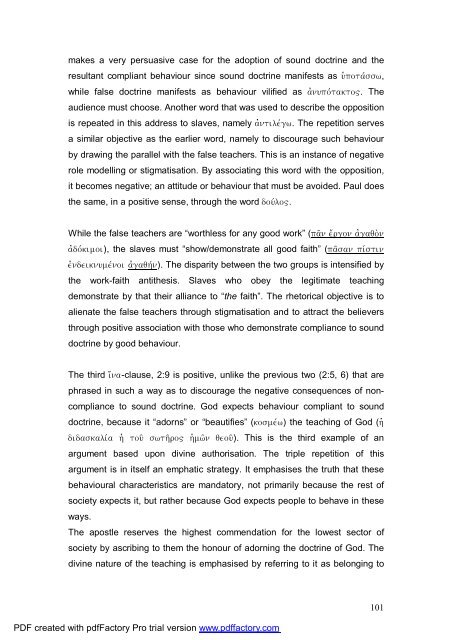A Text centred rhetorical analysis of Paul's Letter to Titus
A Text centred rhetorical analysis of Paul's Letter to Titus
A Text centred rhetorical analysis of Paul's Letter to Titus
You also want an ePaper? Increase the reach of your titles
YUMPU automatically turns print PDFs into web optimized ePapers that Google loves.
makes a very persuasive case for the adoption <strong>of</strong> sound doctrine and the<br />
resultant compliant behaviour since sound doctrine manifests as uJpotavssw,<br />
while false doctrine manifests as behaviour vilified as ajnupovtak<strong>to</strong>~. The<br />
audience must choose. Another word that was used <strong>to</strong> describe the opposition<br />
is repeated in this address <strong>to</strong> slaves, namely ajntilevgw. The repetition serves<br />
a similar objective as the earlier word, namely <strong>to</strong> discourage such behaviour<br />
by drawing the parallel with the false teachers. This is an instance <strong>of</strong> negative<br />
role modelling or stigmatisation. By associating this word with the opposition,<br />
it becomes negative; an attitude or behaviour that must be avoided. Paul does<br />
the same, in a positive sense, through the word douvlo~.<br />
While the false teachers are “worthless for any good work” (pa`n e[rgon ajgaqo;n<br />
ajdovkimoi), the slaves must “show/demonstrate all good faith” (pa`san pivstin<br />
ejndeiknumevnoi ajgaqhvn). The disparity between the two groups is intensified by<br />
the work-faith antithesis. Slaves who obey the legitimate teaching<br />
demonstrate by that their alliance <strong>to</strong> “the faith”. The <strong>rhe<strong>to</strong>rical</strong> objective is <strong>to</strong><br />
alienate the false teachers through stigmatisation and <strong>to</strong> attract the believers<br />
through positive association with those who demonstrate compliance <strong>to</strong> sound<br />
doctrine by good behaviour.<br />
The third i{na-clause, 2:9 is positive, unlike the previous two (2:5, 6) that are<br />
phrased in such a way as <strong>to</strong> discourage the negative consequences <strong>of</strong> non-<br />
compliance <strong>to</strong> sound doctrine. God expects behaviour compliant <strong>to</strong> sound<br />
doctrine, because it “adorns” or “beautifies” (kosmevw) the teaching <strong>of</strong> God (hJ<br />
didaskaliva hJ <strong>to</strong>u` swth`ro" hJmw`n qeou'). This is the third example <strong>of</strong> an<br />
argument based upon divine authorisation. The triple repetition <strong>of</strong> this<br />
argument is in itself an emphatic strategy. It emphasises the truth that these<br />
behavioural characteristics are manda<strong>to</strong>ry, not primarily because the rest <strong>of</strong><br />
society expects it, but rather because God expects people <strong>to</strong> behave in these<br />
ways.<br />
The apostle reserves the highest commendation for the lowest sec<strong>to</strong>r <strong>of</strong><br />
society by ascribing <strong>to</strong> them the honour <strong>of</strong> adorning the doctrine <strong>of</strong> God. The<br />
divine nature <strong>of</strong> the teaching is emphasised by referring <strong>to</strong> it as belonging <strong>to</strong><br />
PDF created with pdfFac<strong>to</strong>ry Pro trial version www.pdffac<strong>to</strong>ry.com<br />
101

















